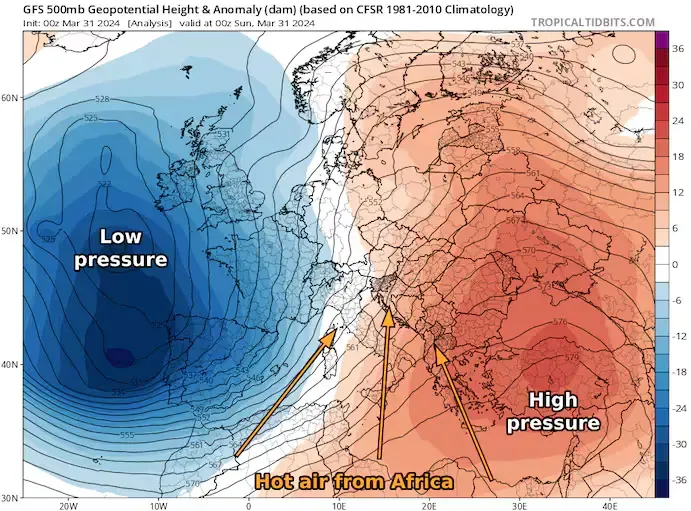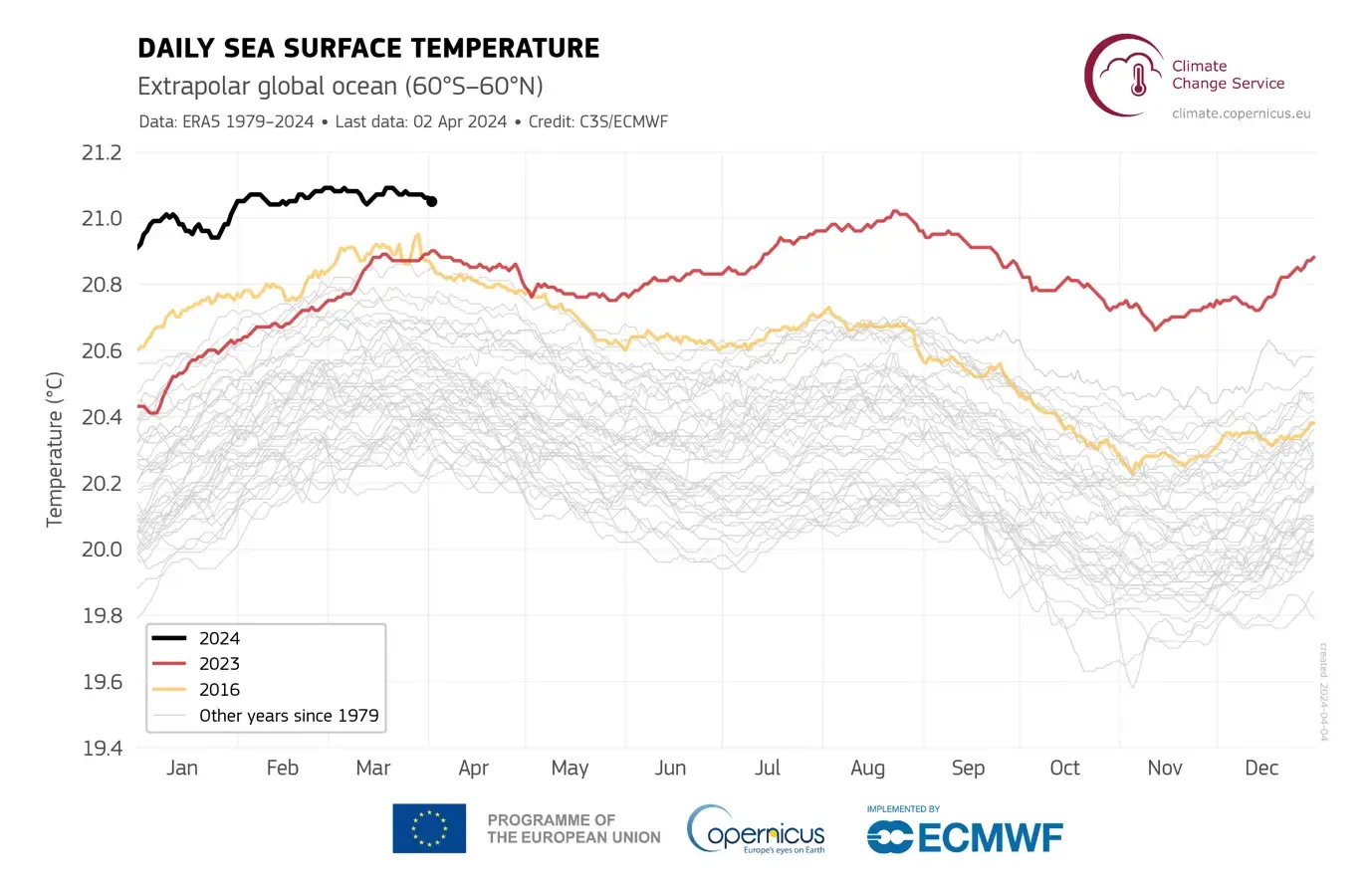Preliminary data reveals that March 2024 has clinched the title of Earth’s warmest month on record, adding to a streak of heat records since 2023, identified as the planet’s hottest year. According to the ERA5 reanalysis dataset, March’s globally averaged temperature surpassed previous records, standing approximately 1.3 degrees Fahrenheit above average and edging past the previous high observed in March 2016.
March 2024: Record-Hottest Tenth Month
Based on the ERA5 reanalysis dataset, the average global temperature for March exceeded the norm by approximately 1.3 degrees Fahrenheit, surpassing the previous record set in 2016 by about 0.2 degrees. While these numbers may not seem remarkable, they hold significance in the context of globally averaged temperature data. This data is compiled from various sources, including weather stations, ships, aircraft, and satellites.
While seemingly incremental, these figures hold significant implications within the realm of globally averaged temperature data, synthesized from measurements collected by weather stations, ships, aircraft, and satellites. March 2024 registered a globally averaged ERA5 surface air temperature of 14.14°C, exceeding the 1991-2020 average for March by 0.73°C and surpassing the previous high set in March 2016 by 0.10°C.

This marks the tenth consecutive month to clinch the title of the warmest on record for its respective month of the year. Moreover, March 2024 outpaced historical averages, standing 1.68°C warmer than an estimate of the March average for the period spanning 1850-1900, designated as the pre-industrial reference period.
🚨March 2024 was the warmest on record according to ERA5 Reanalysis. This is the 10th consecutive month that the Earth has set a new record! 🔥 pic.twitter.com/lbw7tyG6VL
— Brian Brettschneider (@Climatologist49) April 2, 2024
“But its combination with the non-natural marine heat waves made these records so breathtaking,” said Woodwell Climate Research Center scientist Jennifer Francis.
Francis noted that with the decline of El Niño, the magnitude by which global average temperatures surpass previous records each month is anticipated to diminish. Climate scientists attribute the majority of this unprecedented warmth to human-driven climate change, primarily caused by carbon dioxide and methane emissions resulting from the burning of coal, oil, and natural gas.
She emphasized, “The trajectory will not change until concentrations of greenhouse gases in the atmosphere stop rising,” underscoring the urgent need to halt fossil fuel consumption, curb deforestation, and transition to more sustainable agricultural practices.
Francis warned, “Until these critical actions are taken, we should brace for more shattered records.”
Global Temperatures Hit Unprecedented Highs
Further analysis reveals that the global-average temperature for the past twelve months (April 2023 – March 2024) has also hit unprecedented levels, standing at 0.70°C above the 1991-2020 average and a striking 1.58°C above the 1850-1900 pre-industrial average.
The European continent experienced its second warmest March on record, with temperatures averaging 2.12°C above the 1991-2020 average. Notably, temperatures soared most significantly in central and eastern regions. Beyond Europe, above-average temperatures were observed across eastern North America, Greenland, eastern Russia, Central America, parts of South America, many parts of Africa, southern Australia, and sections of Antarctica.
“We’ve had record-breaking months that have been even more unusual,” Burgess said, pointing to February 2024 and September 2023. But the “trajectory is not in the right direction,” she added.
Despite a weakening El Niño in the eastern equatorial Pacific, marine air temperatures remained exceptionally high. The global sea surface temperature averaged for March over 60°S–60°N reached a historic high of 21.07°C, slightly surpassing February’s recorded value of 21.06°C.
In terms of sea ice dynamics, Arctic sea ice extent marked its annual maximum in March, although with a monthly value slightly below average. Meanwhile, Antarctic sea ice extent was 20% below average, continuing a trend of large negative anomalies since 2017.
On the hydrological front, March 2024 saw varied precipitation patterns, with regions of western Europe, Central Asia, Japan, the Arabian Peninsula, Madagascar, and parts of South America experiencing wetter-than-average conditions. Conversely, regions of North America, western Canada, central Asia, China, southeastern Australia, southern Africa, and South America faced drier-than-average conditions.
As Earth continues to grapple with the repercussions of climate change, the unprecedented warmth observed in March 2024 underscores the urgent need for concerted global action to mitigate its far-reaching impacts on the planet’s climate systems and ecosystems.
Summerlike heat in Europe
Over the weekend, Eastern Europe experienced unseasonably warm temperatures reminiscent of summer, with readings reaching the 70s and 80s. This marked a significant departure from the usual early spring conditions, with temperatures soaring approximately 20 to 35 degrees above normal.
Eight countries set national records for March warmth
| Country | Temperature (°F) | Temperature (°C) | Location |
|---|---|---|---|
| Albania | 85.3 | 29.6 | Kuçovë |
| Belarus | 81 | 27.2 | Lelchitsy |
| Croatia | 84.2 | 29 | Osijek |
| Estonia | 70.3 | 21.3 | Valga |
| Latvia | 73 | 22.8 | Skulte |
| Lithuania | 77.9 | 25.5 | Druskininkai |
| Moldova | 84.9 | 29.7 | Sîngerei |
| Poland | 79.5 | 26.4 | Tarlów |
Scores of high temperature records also were set in Greece, Turkey, Ukraine and Russia.
Summerlike heat in Asia
In Eastern Japan, March concluded with temperatures reminiscent of midsummer, signaling a return to the warm conditions that characterized one of the country’s hottest winters on record.
“Jaw-dropping July-like heat blanketed Japan on March 31. 70 places broke or tied the monthly record,” Sayaka Mori, meteorologist with NHK World, wrote on X.
On March 31st, Tokyo experienced scorching temperatures of 82.6 degrees (28.1 C), breaking a record that stood since 1876 by nearly 5 degrees. This heatwave followed an unusually cool period, delaying the blooming of cherry blossoms, a famous event in the city, which occurred at the latest date in 12 years.

Several other cities in Japan’s main island, Honshu, also recorded record high temperatures for March, including Fuji, Nakamura, Narita, Tsukuba, and Yokohama.
Similar record-breaking heat was observed in parts of West Africa, Central America, and other tropical regions worldwide. La Fragua in Guatemala reached 111.2 degrees (44 C), marking the highest temperature ever recorded in Central America. Costa Rica saw multiple record highs, with temperatures reaching as high as 106.7 degrees (41.5 C), while neighboring countries also experienced unprecedented heat.
The Solomon Islands experienced their hottest March day, with temperatures soaring up to 95.9 degrees (35.5 C).
Keep Reading
Cold wave continues to grip North India
Production of industrial chemicals reached 230 million tonnes every year
As May records wettest during last 10 years in J&K, stats reveal no major change in precipitation
Extreme weather events threaten life & economies amid global water crisis
India Monsoon: July is wettest month in last 29 years
Follow Ground Report for Climate Change and Under-Reported issues in India. Connect with us on Facebook, Twitter, Koo App, Instagram, Whatsapp and YouTube. Write us on GReport2018@gmail.com.









